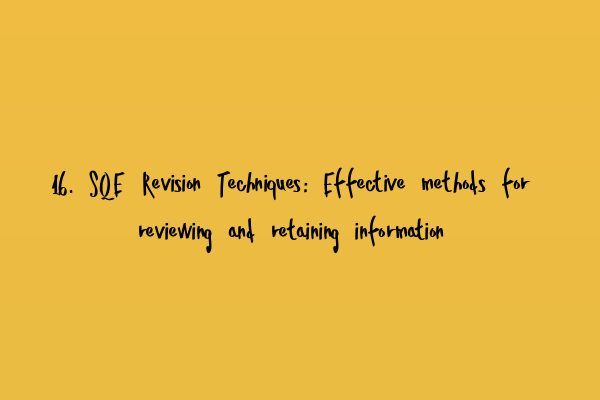SQE Revision Techniques: Effective methods for reviewing and retaining information
Preparing for the Solicitors Qualifying Examination (SQE) is no small feat. With the new format and structure, it is essential for aspiring solicitors to develop effective revision techniques that will help them review and retain the necessary information for success.
In this article, we will explore a variety of proven methods to optimize your SQE revision process. By incorporating these techniques into your study routine, you will increase your chances of achieving the desired exam results.
1. Create a Study Schedule
One of the key elements to successful revision is having a well-structured study schedule. By creating a detailed timetable, you can allocate specific time slots for each topic or subject area, ensuring you cover all the necessary material.
When planning your study schedule, take into account your personal preferences and learning style. Some individuals find it beneficial to dedicate larger blocks of time to a single subject, while others prefer shorter, more frequent study sessions. Experiment with different approaches to find the one that suits you best.
Related Article: Conquer the Multiple Choice Questions (MCQ) in SQE1
2. Active Learning
Passively reading through textbooks or lecture notes may not be the most effective way to retain information. Instead, engage in active learning techniques such as summarizing key points, creating flashcards, or teaching the material to someone else.
By actively participating in the learning process, you enhance your comprehension and retention. Encourage yourself to ask questions and seek clarification when something is unclear. Practice applying the knowledge in practical scenarios, as this will help you solidify your understanding.
3. Utilize SQE Sample Papers
To enhance your understanding of the exam format and question types, make use of SQE sample papers. These practice tests simulate the real exam environment and provide you with valuable insights into the level of difficulty and the expected format.
By regularly practicing with sample papers, you develop a familiarity with the types of questions you may encounter on the actual exam. Additionally, these practice tests enable you to identify areas where you need to strengthen your knowledge and focus your revision efforts accordingly.
Related Article: SQE Sample Papers: Practice for Exam Success
4. Use Visual Aids
The use of visual aids can significantly enhance your revision process. Diagrams, mind maps, flowcharts, and other visual representations of information can help you digest complex concepts and remember them more effectively.
Visual aids can assist in organizing information, making connections between different topics, and identifying key elements. They serve as a visual memory trigger, aiding in recall during the exam. Incorporate this technique into your revision routine to enhance comprehension and retention.
5. Review and Revise Regularly
Regular review and revision are crucial to long-term retention. Instead of cramming vast amounts of information at the last minute, aim to revise regularly throughout your study period.
Set aside dedicated time every week to review previous topics, ensuring that the information remains fresh in your mind. As you progress through your studies, revisit previous subjects to reinforce your understanding and identify any areas that require further attention.
Related Article: Focus Areas in SQE1 and SQE2: Mastering Key Concepts
6. Seek Feedback
Feedback is a vital component in the learning process. Engage in SQE mock exams or seek feedback from tutors, mentors, or study partners to gauge your progress and identify areas for improvement.
Mock exams provide an excellent opportunity to simulate the exam conditions, identify weak areas, and adjust your study approach accordingly. Analyze your performance, review the questions you struggled with, and seek guidance on how to improve.
Related Article: Adjusting Your SQE Strategy Based on Mock Performance
7. Join Study Groups
Studying with peers can be highly beneficial. Joining a study group allows you to engage in discussions, share different perspectives, and consolidate your knowledge through collaborative learning.
Explaining concepts to others and listening to their interpretations can enhance your understanding and retention. Additionally, study groups provide a supportive environment where you can clarify doubts and motivate each other throughout the revision process.
8. Take Breaks
While it may seem counterintuitive, taking regular breaks is crucial for productive revision. Continuous, uninterrupted study sessions can lead to burnout and hinder information retention.
Plan short breaks between study sessions to recharge your mind and maintain focus. Engage in activities that relax and rejuvenate you, such as going for a walk, practicing mindfulness, or pursuing a hobby. Return to your study with renewed energy and improved concentration.
9. Embrace Technology
Make the most of technology to aid your revision. Utilize various electronic resources, such as digital flashcards, online forums, and educational apps tailored to SQE preparation.
These tools can streamline your revision process, provide interactive learning experiences, and offer convenient access to study materials. Experiment with different technological resources to find the ones that complement your preferred learning style.
10. Prioritize Your Health and Well-being
Finally, do not overlook the importance of maintaining a healthy lifestyle during your revision period. Adequate sleep, balanced nutrition, exercise, and stress management techniques are crucial for optimizing your cognitive function and overall well-being.
Take care of your physical and mental health to ensure you are in an optimal state to absorb and retain information effectively. Incorporate self-care activities into your study routine to maintain a balanced approach.
Related Article: SQE Mock Debrief Sessions: Critical Steps for Improvement
In Conclusion
Effectively reviewing and retaining information is key to success in the Solicitors Qualifying Examination (SQE). By incorporating these techniques into your study routine, you can optimize your revision process and increase your chances of achieving the desired exam results.
Remember to create a study schedule, engage in active learning, utilize SQE sample papers, use visual aids, review regularly, seek feedback, join study groups, take breaks, embrace technology, and prioritize your health and well-being.
With the right approach and dedication, you can confidently navigate the SQE and attain your goal of becoming a qualified solicitor.
